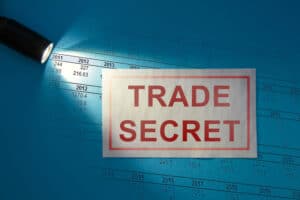Consider a spy movie from the 1960s. A young agent hurries down a busy sidewalk, peering over her shoulder as she lugs a black leather briefcase stuffed with classified information. This may be the picture that springs to mind when you think about trade secret theft. The reality of California’s trade secret legislation is even more complicated (and a little less exciting).
Read on to learn more and then contact Chambers Law Firm at 714-760-4088 if you have been charged with this crime.
What does it mean to have a “trade secret” in California?
A precise formula for manufacturing a chemical is a simple example of a trade secret. A strategy for effectively scheduling people for work shifts or cutting cloth rapidly are more sophisticated examples. There are two traits that all trade secrets have in common:
- Because the knowledge isn’t widely known, it’s extremely valuable.
- The owner has kept the information hidden on purpose.
Secrecy adds value
To be considered a trade secret, information must be commercially valuable and unknown to the general public or those who may profit from it. The grilled cheese sandwich recipe isn’t a trade secret because it’s widely known. However, there may be a secret method for producing the greatest grilled cheese sandwiches that can be sold for a profit.
Owner’s reasonable efforts to keep it a secret
To qualify as a trade secret, the information’s owner must have taken “reasonable under the circumstances” efforts to keep it hidden. This might involve just informing workers who have a “need to know” about the secret and not making any information about it publicly available.
What does the California trade secrets law define as “theft”?
Theft of trade secrets necessitates both the intention and the action of stealing a trade secret from its owner. Intent means you took the trade secret with the intent of utilizing it for yourself, selling it to someone else, or preventing the owner from using it.
The action of stealing can be physically stealing and taking away a trade secret. However, it may also include lying to get access to a trade secret, copying a trade secret without authorization, or duplicating the secret after promising to keep it a secret.
Is it illegal to sell trade secrets without permission?
Yes. The selling or acquisition of trade secrets without authorization is likewise prohibited under California law. A trade secret owner’s employee may not “promise, offer, or deliver” a trade secret to anybody who has not been authorized to receive it by the owner.
The trade secret must, however, be supplied in exchange for some form of advantage, bribe, or incentive in order for this distinct allegation to apply. Even though no money is transferred, if you were given a position at a competitor for stealing the trade secret, a beneficial exchange may occur. It’s also against the law to propose to acquire a trade secret if you know the seller isn’t allowed to sell it by their company.
If you are facing charges or accusations of theft of a trade secret, contact Chambers Law Firm at 714-760-4088 for a free legal consultation.





